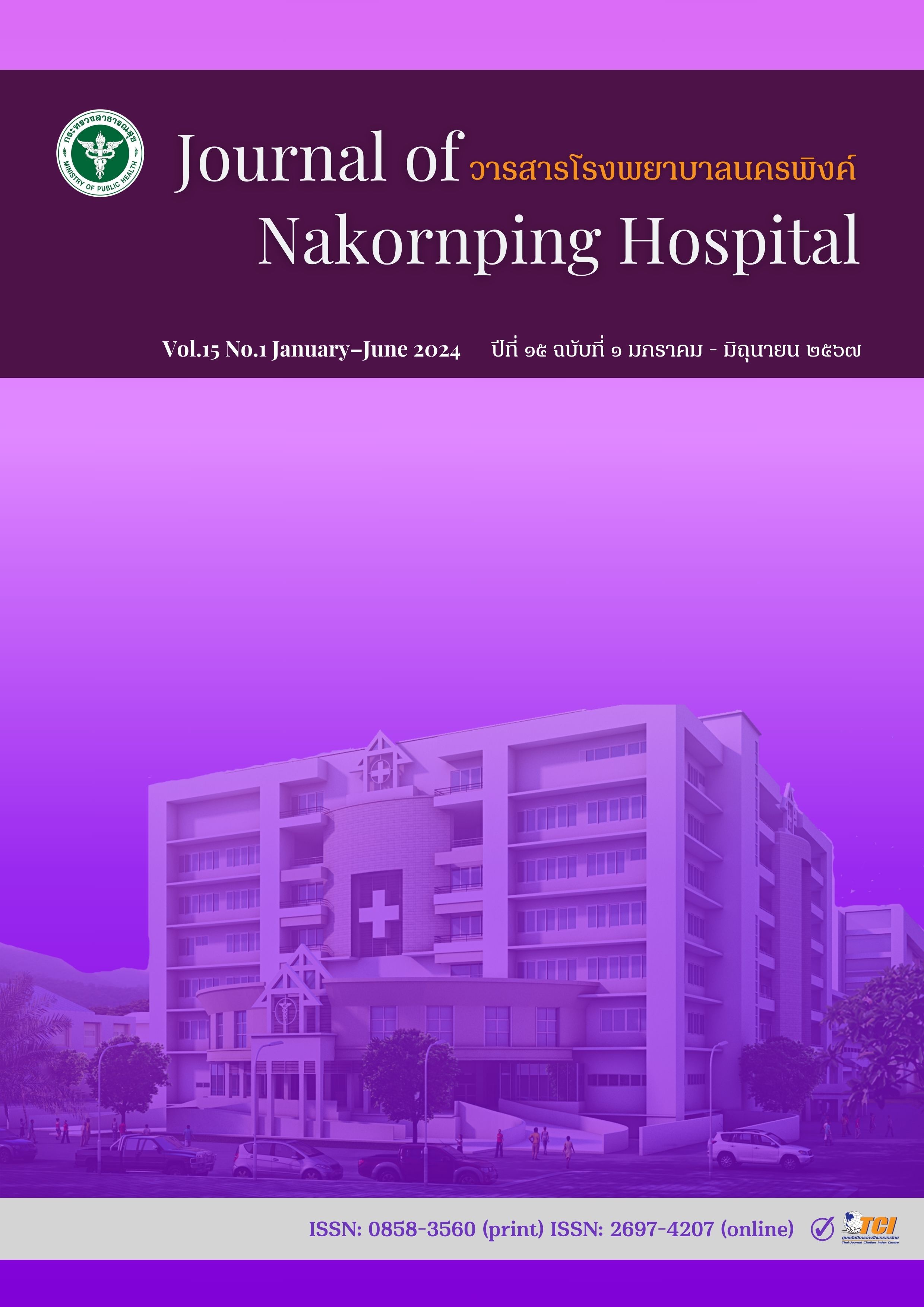Effects of health literacy intervention on health outcomes in type 2 diabetic patients in Health Promoting Hospital
Keywords:
Health literacy, Diabetes, HbA1c, Drug costsAbstract
Background: Evidence has indicated the positive effect of health literacy on blood sugar control in diabetic patients. Health literacy intervention for diabetes has been implemented at Ban Fon Health Promoting Hospital (HPH) since 2019. This study aims to compare health outcomes alongside drug costs of such intervention.
Methodology: A retrospective cohort was conducted in diabetic patients who were diagnosed with diabetes at Ban Fon HPH in 2019-2020 with an implementation of Health literacy intervention for diabetes was initiated in 2019. Data of HbA1c, fasting blood sugar, LDL-c, HDL-c, and triglyceride level were retrieved and compared between 2019 and 2020. Costs of diabetic drugs for each patient per day were calculated from the last dose of each diabetic drug in each year times drug costs. Paired sample t-test was applied to compare health outcomes and diabetic drug costs. Multilevel linear regression analysis of repeated measure data was employed to examine the association between health literacy intervention and health outcomes.
Results: The total of diabetic patients was 141, of which, 101 (71.63%) were female. Health outcomes of diabetic patients after receiving health literacy intervention showed that the level of HbA1c was decreased by 0.24%. Results from the multilevel linear regression analysis indicate that health literacy intervention decreased HbA1c levels by 0.37 (95% CI: -0.548, -0.180). There was no difference in the costs of diabetic drugs between years.
Conclusion: Health literacy intervention effectively reduces HbA1c levels in diabetic patients, without increasing the drug costs. Combining health literacy intervention into the conventional diabetic care could improve the efficiency of treatment.
References
International Diabetes Federation. IDF DIABETES ATLAS 2021. 10th ed. Belgium: International Diabetes Federation; 2021. Available from: https://diabetesatlas.org/idfawp/resource-files/2021/07/IDF_Atlas_10th_Edition_2021.pdf
Patanavanich R, Vityananan P, Neelapaichit N, Chariyalertsak S, Kessomboon P, Assanangkornchai S, et al. Association between electronic cigarette use and depression among Thai adolescents: The Thailand National Health Examination Survey 2019–2020. Tob Induc Dis. 2022;20:103. doi: 10.18332/tid/155333.
Nutbeam D. Defining and measuring health literacy: what can we learn from literacy studies? Int J Public Health. 2009;54(5):303-5. doi: 10.1007/s00038-009-0050-x.
Nutbeam D. Health literacy as a public health goal: a challenge for contemporary health education and communication strategies into the 21st century. Health promotion international. 2000;15(3):259-67.
Chrvala CA, Sherr D, Lipman RD. Diabetes self-management education for adults with type 2 diabetes mellitus: A systematic review of the effect on glycemic control. Patient Educ Couns. 2016;99(6):926-43. doi: 10.1016/j.pec.2015.11.003.
Wang RH, Hsu HC, Lee YJ, Shin SJ, Lin KD, An LW. Patient empowerment interacts with health literacy to associate with subsequent self-management behaviors in patients with type 2 diabetes: A prospective study in Taiwan. Patient Educ Couns. 2016;99(10):1626-31. doi: 10.1016/j.pec.2016.04.001.
Marciano L, Camerini AL, Schulz PJ. The Role of Health Literacy in Diabetes Knowledge, Self-Care, and Glycemic Control: a Meta-analysis. J Gen Intern Med. 2019;34(6):1007-17. doi: 10.1007/s11606-019-04832-y.
Serbim A, Paskulin L, Nutbeam D. Improving health literacy among older people through primary health care units in Brazil: feasibility study. Health Promot Int. 2020;35(6):1256-66. doi: 10.1093/heapro/daz121.
Kidney Disease Improving Global Outcomes. KDIGO 2022 clinical practice guideline for the evaluation and management of chronic kidney disease. Kidney int. 2022;102(Suppl 5s):S1-127. Available from: https://kdigo.org/wp-content/uploads/2022/10/KDIGO-2022-Clinical-Practice-Guideline-for-Diabetes-Management-in-CKD.pdf
StataCorp. Stata: Release 13. Statistical Software. College Station, TX: StataCorp LP; 2013.
Doshmangir P, Jahangiry L, Farhangi MA, Doshmangir L, Faraji L. The effectiveness of theory- and model-based lifestyle interventions on HbA1c among patients with type 2 diabetes: a systematic review and meta-analysis. Public Health. 2018;155:133-41. doi: 10.1016/j.puhe.2017.11.022.
Wolf MS, Seligman H, Davis TC, Fleming DA, Curtis LM, Pandit AU, et al. Clinic-based versus outsourced implementation of a diabetes health literacy intervention. J Gen Intern Med. 2014;29(1):59-67. doi: 10.1007/s11606-013-2582-2.
Bailey SC, Brega AG, Crutchfield TM, Elasy T, Herr H, Kaphingst K, et al. Update on health literacy and diabetes. Diabetes Educ. 2014;40(5):581-604. doi: 10.1177/0145721714540220.
Leung E, Wongrakpanich S, Munshi MN. Diabetes Management in the Elderly. Diabetes Spectr. 2018;31(3):245-53. doi: 10.2337/ds18-0033.
Osborn CY, Cavanaugh K, Wallston KA, White RO, Rothman RL. Diabetes numeracy: an overlooked factor in understanding racial disparities in glycemic control. Diabetes Care. 2009;32(9):1614-9. doi: 10.2337/dc09-0425.
Adham M, Froelicher ES, Batieha A, Ajlouni K. Glycaemic control and its associated factors in type 2 diabetic patients in Amman, Jordan. East Mediterr Health J. 2010;16(7):732-9.
Kanglee K. Factors Associated With Glycemic Control Among People With Type 2 DiabetesMellitus at Phramongkutklao Hospital, Bangkok. Journal of The Royal Thai Army Nurses. 2014;15(3):256-68. [In Thai]
Neelasri J, Tanaphuwanont O. Factors Associated with HbA1c Levels Of Type 2 Diabetes Patients,Thayang Hospital, Phetchaburi Province, Thailand. Region 4-5 Medical Journal. 2020;39(4):714-28. [In Thai]
Ahmad NS, Islahudin F, Paraidathathu T. Factors associated with good glycemic control among patients with type 2 diabetes mellitus. J Diabetes Investig. 2014;5(5):563-9. doi: 10.1111/jdi.12175.
Fekadu G, Bula K, Bayisa G, Turi E, Tolossa T, Kasaye HK. Challenges And Factors Associated With Poor Glycemic Control Among Type 2 Diabetes Mellitus Patients At Nekemte Referral Hospital, Western Ethiopia. J Multidiscip Healthc. 2019;12:963-74. doi: 10.2147/JMDH.S232691.
Pamungkas RA, Hadijah St, Mayasari A, Nusdin N. FACTORS ASSOCIATED WITH POOR GLYCEMIC CONTROL AMONG TYPE 2 DIABETES MELLITUS IN INDONESIA. Belitung Nursing Journal. 2017;3(3):272-80. doi: https://doi.org/10.33546/bnj.61.
Downloads
Published
How to Cite
Issue
Section
License
Copyright (c) 2024 Nakornping Hospital

This work is licensed under a Creative Commons Attribution-NonCommercial-NoDerivatives 4.0 International License.
The articles that had been published in the journal is copyright of Journal of Nakornping hospital, Chiang Mai.
Contents and comments in the articles in Journal of Nakornping hospital are at owner’s responsibilities that editor team may not totally agree with.



